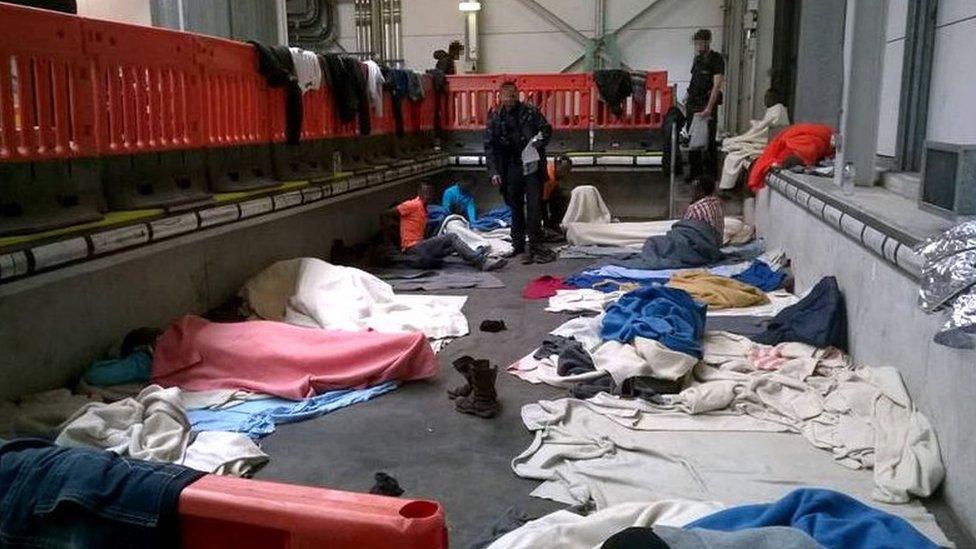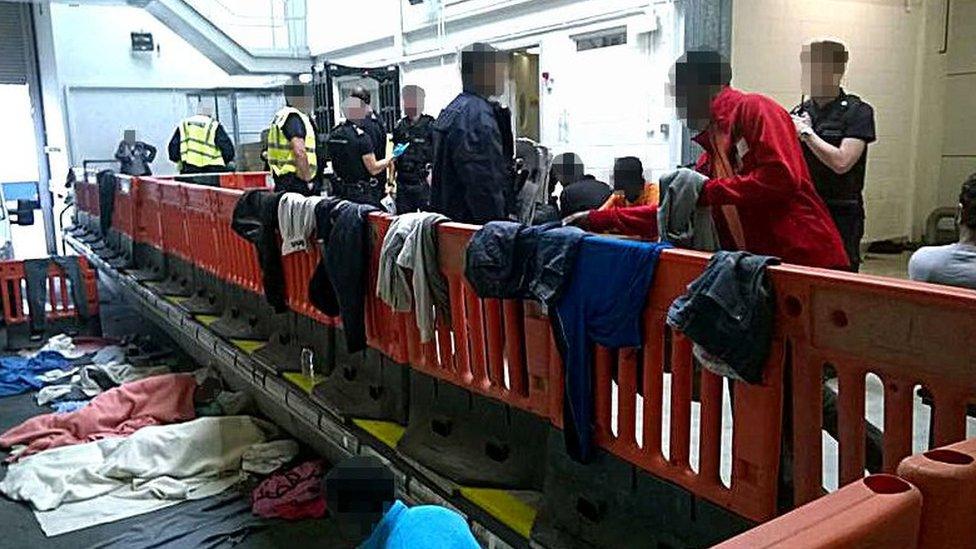Channel migrants detained in freight shed
- Published

Detained: The temporary holding shed at Folkestone
Channel border officials were so "overwhelmed" by clandestine migrants last year they had to house some of them in a freight shed, inspectors say.
A report says officials could not cope with the thousands who arrived at Folkestone and Dover over the summer.
Peter Clarke, the chief inspector of prisons, said it was "unacceptable" that officials did not work out more quickly how to manage the crisis.
Immigration minister James Brokenshire said the shed would not be used again.
The prisons watchdog, which also inspects immigration detention facilities, investigated conditions at Channel facilities last October following the summer's rise in attempts to enter the UK via the Channel Tunnel.
The first nine months of 2014 saw 2,118 detentions - a figure that more than doubled to 4,785 in the same period the following year.
More than 3,500 people were held over the summer months, including 370 children who had arrived without adults. Many of the arrivals were from Eritrea, Sudan and Syria.
Mr Clarke said immigration officials and Tascor, the company running the Channel's holding facilities, came under "considerable pressure" and that led to the decision to detain some people, including children, at Longport Freight Shed in Folkestone.
But the Home Office didn't contract Tascor to manage Longport so the detainees were overseen by an immigration enforcement team who didn't have the right training.
Inspectors found the conditions fundamentally lacked decency. Migrants were sleeping on concrete floors in unhygienic conditions with no clean or dry clothes and no food or hot drinks.

Inspectors described conditions in the shed as unsanitary
Many had not eaten for long periods and were dehydrated. Some had scabies, headaches or were suffering from diarrhoea.
Another facility, Frontier House in Folkestone, had nowhere suitable to sleep and a third at Dover Seaport was "crowded, poorly ventilated and smelled badly".
"There is no doubt that the increases in migration initially overwhelmed the existing facilities and an emergency response was required," said Mr Clarke.
"This inspection took place some months after that emergency response was initiated and it was unacceptable that arrangements were still not in place to process detainees quickly, efficiently and decently, while ensuring that the most vulnerable, such as children, were safe and that the basic physical needs of all detainees for food, rest and clothing were met."
Inspectors did, however, welcome plans to refurbish the Dover Seaport holding room and praised a project that helped charities and other organisations support detained migrants.
Mr Brokenshire said the Home Office had already accepted most of Mr Clarke's recommendations.
"Last summer we saw unprecedented numbers of migrants trying to reach the UK illegally, particularly through Kent," he said.
"For a short time the Longport freight shed was temporarily used to accommodate migrants on their arrival and ease exceptional pressures on our existing screening centres. This was not acceptable and we are clear it will not be used in this way again."
- Published3 March 2016
